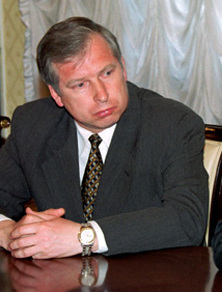Federal Drug Control Service of Russia
The Federal Drug Control Service of Russia (FDCS) (Lua error in package.lua at line 80: module 'strict' not found.
, ФСКН России) was a federal law enforcement agency of the Russian Federation responsible for combating the illegal drug trade and enforcing drug control policies. The agency was established in 2003 and was dissolved in 2016, with its functions transferred to the Ministry of Internal Affairs.
History[edit | edit source]
The FDCS was created by a decree of the President of Russia in 2003, as part of a broader effort to combat the growing problem of drug abuse and trafficking in Russia. The agency was tasked with implementing state policy on drug control, coordinating the activities of other government bodies in this area, and conducting investigations and operations to combat drug-related crimes. In 2016, the FDCS was dissolved by another presidential decree, and its responsibilities were transferred to the Ministry of Internal Affairs. This move was part of a larger reorganization of Russia's law enforcement agencies aimed at improving efficiency and reducing redundancy.
Structure[edit | edit source]
The FDCS was headed by a Director, who was appointed by the President of Russia. The agency was divided into several departments, each responsible for different aspects of drug control, including:
- Operational and investigative activities
- Coordination of interagency efforts
- International cooperation
- Prevention and public awareness
Functions[edit | edit source]
The main functions of the FDCS included:
- Conducting investigations and operations to combat drug trafficking and related crimes
- Implementing state policy on drug control
- Coordinating the activities of other government bodies involved in drug control
- Engaging in international cooperation to combat drug trafficking
- Conducting public awareness campaigns and prevention programs
International Cooperation[edit | edit source]
The FDCS actively cooperated with international organizations and law enforcement agencies from other countries to combat the global drug trade. This included participation in joint operations, information sharing, and collaboration on policy development.
Dissolution[edit | edit source]
In April 2016, the FDCS was officially dissolved, and its functions were transferred to the Ministry of Internal Affairs. This reorganization was part of a broader effort to streamline Russia's law enforcement agencies and improve their effectiveness in combating crime.
See Also[edit | edit source]
- Ministry of Internal Affairs (Russia)
- Federal Security Service (Russia)
- Drug policy of Russia
- Law enforcement in Russia
References[edit | edit source]
This article is a law enforcement–related stub. You can help WikiMD by expanding it!
Search WikiMD
Ad.Tired of being Overweight? Try W8MD's physician weight loss program.
Semaglutide (Ozempic / Wegovy and Tirzepatide (Mounjaro / Zepbound) available.
Advertise on WikiMD
|
WikiMD's Wellness Encyclopedia |
| Let Food Be Thy Medicine Medicine Thy Food - Hippocrates |
Translate this page: - East Asian
中文,
日本,
한국어,
South Asian
हिन्दी,
தமிழ்,
తెలుగు,
Urdu,
ಕನ್ನಡ,
Southeast Asian
Indonesian,
Vietnamese,
Thai,
မြန်မာဘာသာ,
বাংলা
European
español,
Deutsch,
français,
Greek,
português do Brasil,
polski,
română,
русский,
Nederlands,
norsk,
svenska,
suomi,
Italian
Middle Eastern & African
عربى,
Turkish,
Persian,
Hebrew,
Afrikaans,
isiZulu,
Kiswahili,
Other
Bulgarian,
Hungarian,
Czech,
Swedish,
മലയാളം,
मराठी,
ਪੰਜਾਬੀ,
ગુજરાતી,
Portuguese,
Ukrainian
Medical Disclaimer: WikiMD is not a substitute for professional medical advice. The information on WikiMD is provided as an information resource only, may be incorrect, outdated or misleading, and is not to be used or relied on for any diagnostic or treatment purposes. Please consult your health care provider before making any healthcare decisions or for guidance about a specific medical condition. WikiMD expressly disclaims responsibility, and shall have no liability, for any damages, loss, injury, or liability whatsoever suffered as a result of your reliance on the information contained in this site. By visiting this site you agree to the foregoing terms and conditions, which may from time to time be changed or supplemented by WikiMD. If you do not agree to the foregoing terms and conditions, you should not enter or use this site. See full disclaimer.
Credits:Most images are courtesy of Wikimedia commons, and templates, categories Wikipedia, licensed under CC BY SA or similar.
Contributors: Prab R. Tumpati, MD



